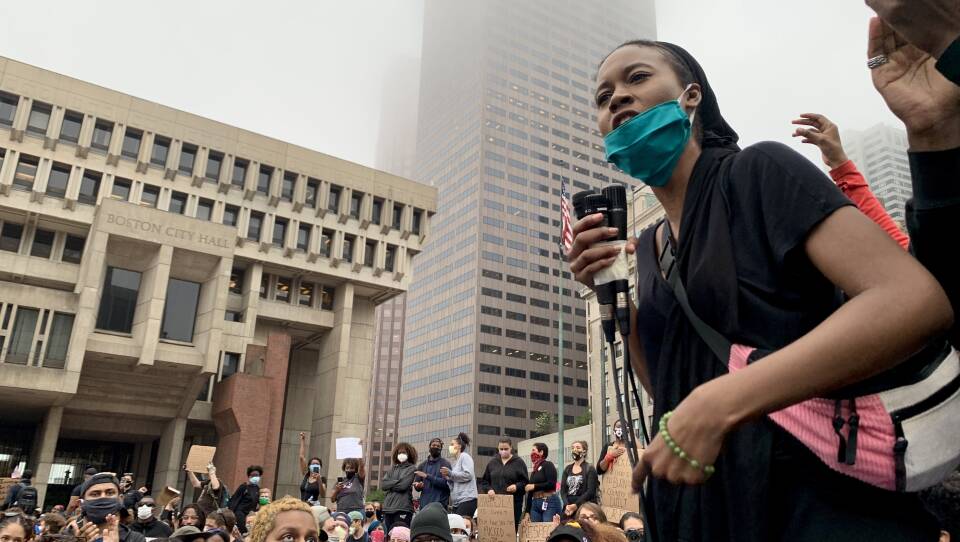Riding into City Hall Plaza in the bed of a pickup truck, Vikiana Petit-Homme raised a bright red megaphone to her lips in an attempt to summon Mayor Marty Walsh.
“Marty, where are you?” Petit-Homme sang out, drawing out each word. “We’re here.”
Behind Petit-Homme, a crowd of nearly 2,000 protesters filed into the plaza, finishing a march that began in Roxbury’s Nubian Square Wednesday afternoon. Carrying signs reading “DEFUND THE POLICE” and “GET POLICE OUT OF SCHOOLS,” protesters followed a small group of youth organizers, all young, black and brown Boston natives who recently joined forces to call on the city to “defund the police.”
“I'm not asking for different training for police,” Petit-Homme said. “It's not that they're inefficient. They're harmful to our communities. They're actively causing pain.”
Organizers came with a specific list of demands for Walsh and the Boston City Council: Remove 10 percent (roughly $41 million) of the Boston Police Department’s funding in the city budget, do not increase the police budget, and put a cap on both overtime accrual for officers and overtime pay for military exercises. Additionally, protesters called on the city to remove police officers from schools and replace them with mental health professionals.
“Ten percent is literally the bare minimum," Petit-Homme said. "We want to see that $41 million not be redistributed among other areas throughout the police department. We want that to go to the community itself, and we want the community to decide how to use those funds.”
Organizer Queen-Cheyanne Wade emphasized the importance of allowing communities to reallocate the funds in ways that they would deem important, not from the top down.
“These communities are not ignorant, we are not stupid. We know how to keep ourselves safe,” Wade said. “We know how to engage in our communities in safe ways that can rebuild ourselves.”
Along the march through Chinatown, organizer Guyclaude Locossade took the megaphone and turned directly to a group of police officers watching closely from the sidelines of the march.
“Look at me, officers,” he said. “Am I a black man? Should I be scared to walk down the street?”
Locossade turned his megaphone back to the crowd.
“I refuse to live in a system where I'm going to have to be scared of my neighbors and the people that are sworn to protect me,” he said. “We can't exist like this. But by funding the police and not putting our kids first, this is going to happen time and time again. How many more people got to die for this?”
Poet Armani Thomas stood up on the truck-turned-soapbox and took the megaphone, pivoting to the topic of “good cops.”
“Of course there are some good apples,” he said. “The problem isn’t the apples, it’s the tree.”
At a press conference at City Hall earlier on Wednesday, Walsh said he plans to meet with the police department “to talk about their budget,” but said he “can’t get specific right now, because we’re in the process of reworking the budget.”
In a statement earlier in the week, Walsh told reporters he was considering reallocating funds from police to community-led initiatives and talking with the city council regarding a possible redistribution of funds.
“I've spent the last week talking with my Cabinet and employees at City Hall about how we make sure we are not just reacting to the events in Minneapolis, but how do we make sure that we are responding in a way that’s meaningful and brings about systemic change," Walsh said in a statement.
According to Walsh’s office, 11 percent of Boston’s budget — $414 million — goes to police. But against a national backdrop of police forces being defunded, disbanded and demilitarized across the country, Boston is feeling the pressure from activists like Petit-Homme.
“I'd love it if [Walsh] could have more conversations with the community itself about these things,” Petit-Homme said. “This is so much more than just today. We actually have to think about the entire way that our budgeting process runs, because it's not community-led. It's not accessible to the community.”





